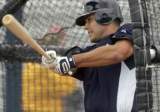 .........
.........
By the time you finish this series, you'll know as much about the decision as I do, which is (1) more than any other blogger knows, New York or Seattle ;- ) and (2) almost nothing. As you know, Dr. D lives to serve.
Jesus Montero will be moved off catcher in either of these two specific events:
- He is weak in each and every aspect of run prevention (not just in one or two), OR
- He cannot call a game, and the pitchers hate him.
If neither of those two specific things apply, then Jesus Montero could catch in the big leagues, if you wanted him to.
.
=== Quantifying Catcher Defense - Large Mammals, Small Mammals Dept. ===
Saberdweebs can now measure some aspects of catcher defense with fair reliability. Not so as to say we would use our outdoor voice when applying them to anybody.
Read this Hardball Times article and this outstanding PSA summary of the state of catcher-D sabermetics. You can add up the stolen bases yielded by, say, Posada and Martin, and you'll find that the difference is only about 10 runs per year between the best catcher in the league (in 2011) and the worst. That's +5 runs for the great one and -5 runs for the terrible one.
Pitch framing is, surprisingly, more important, and more persistent from year to year. There, the spread is +10 runs to -10 runs ... twenty runs between best and worst. Remember, that means if Montero is the worst pitch-framer, you deduct -10 runs from his contribution, not -20.
Pitch blocking has a spread of about 13 runs ... +6 runs for the best, -7 runs for the worst. Here, let's chart that:
| Skill | Best in AL | Worst in AL | Spread | D PENALTY for WORST |
| CS% | +5 | -5 | 10 | -5 vs average |
| Frame | +10 | -10 | 20 | -10 |
| Blocking | +6 | -7 | 13 | -7 |
| Total | +21 | +22 | 43 | -22 ( ie, 2.2 WAR) |
But! Note carefully that no one catcher is the worst at everything. The penalties do not accumulate!
The best pitch-blockers are little quick guys. The best throwers are big strong guys. It's not like Miguel Olivo is weak at everything: he's got a problem blocking pitches, but he's got a rifle arm. The two factors cancel each other. Capiche?
The same is true with hitting in general and defense in general, if you haven't noticed. Speed creates good defense. Strength creates good hitting. Large mammals, small mammals Dept.
True, once in a while you get a freak, like Pudge Rodriguez. Then he might play ten years for his glove alone.
...........
That's why Gassko puzzles, why does catcher defense seem to matter so much less than defense at other positions?
So, if we’ve established that catcher is an important defensive position, why is it that the defensive differences between the best and worst catchers seem so small? In Lichtman’s UZR ratings, the difference between the best and worst catcher is about 20 runs. In my ratings, the difference is about the same. Win Shares show a difference of about 25 runs.
Meanwhile, the variance at other positions is much greater with all systems, generally between 40 and 50 runs. This would suggest that it is a lot more important to put a good defensive player at position other than catcher, even if commonly held beliefs indicate otherwise.
AND you have the fact that UZR (etc) shows good numbers one year, bad years another year, for all fielders. Miguel Olivo isn't -7 runs one year, and then -7 runs again then next year. He's -8 one year, and then +2 the next.
Because no one factor of the catching game affects many runs, and because catchers are good at one thing and weak in another .... I can't find any catcher on Fangraphs who averages even -10 runs year-to-year on fielding runs. Let me read that sentence again.
That's why you get Gassko's fine article asking the right question, "Why do the stats say that catcher defense doesn't matter? Managers think it does!"
.
[Next]
Add comment